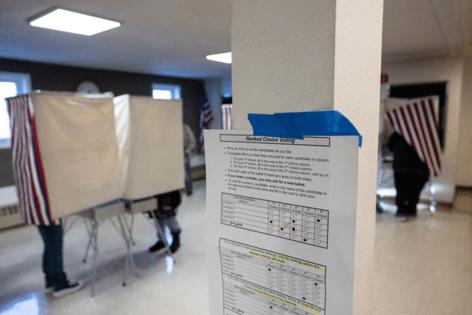Recount of Alaska ranked choice voting measure will likely start Wednesday. Here's how it will work
Published in News & Features
ANCHORAGE, Alaska — The director of the Alaska Division of Elections says that the recount of a narrowly defeated ballot measure will likely begin Wednesday.
The division certified general election results on Saturday. They showed that the ballot measure to repeal ranked choice voting and open primaries lost 49.89% to 50.11%, reflecting a gap of 737 votes — slightly bigger than what the unofficial results indicated Nov. 20, when the margin was reported at 664 votes.
Republican Alaska Lt. Gov. Nancy Dahlstrom announced her intention last week to recount the statewide initiative "with results as close as these." The Alaska Republican Party separately said that it was going to request a recount.
In a Monday interview, Carol Beecher, state elections director, said that the recount would likely start Wednesday in Juneau. She said that there could "be a little bit of a learning curve."
The division is planning to use up to six high-speed Dominion ballot scanning machines for the first-of-its-kind recount, she said. Big stacks of ballots can be fed into the machines as votes are counted district by district, she said.
A picture of each ballot will be displayed to a group of observers who are allowed to witness the recount under state law.
"So each ballot can be looked at to adjudicate whether or not it was an indeterminate mark or correctly marked on the ballot," Beecher said.
Observers can challenge a ballot. The division's attorneys then determine whether to accept the vote as legitimate — a ruling that can be appealed in court, Beecher said.
One observer announced by the Alaska Republican Party is Trump-aligned attorney Harmeet K. Dhillon, who was hired by the GOP to help oversee the recount process.
Alaska Republican Party chair Carmela Warfield did not immediately respond to a request for comment Monday. Neither did Dhillon.
The statewide recount planned this year in Alaska is notably different from one conducted four years ago.
In 2020, then-Lt. Gov. Kevin Meyer ordered an unprecedented audit of the ballot measure that implemented ranked choice voting and open primaries. The audit was conducted as a hand count of all the ballots cast in Alaska that year.
That year, President-elect Donald Trump and Republican voters had baselessly claimed that Dominion equipment changed votes on a large scale.
The Alaska Division of Elections had awarded a $4.4 million contract to Dominion in 2019. Meyer said in 2020 that he ordered the audit, "just to assure folks that you can trust the machines."
The hand count showed a difference of 24 votes from the machine-count results certified by the division.
But accusations of fraud did not end. In 2022, Meyer said there continued to be "misinformation" that Alaska's Dominion voting equipment could change votes and report fraudulent results.
"We do not use voting machines — rather, we utilize ballot tabulators that are not connected to the internet and simply count the voted paper ballots," he said at the time.
Later that year, the Matanuska-Susitna Borough banned voting machines from being used in local elections over fraud concerns. In April last year, Fox News agreed to pay a $787 million settlement to Dominion on the eve of a trial over a lawsuit that sought to expose how the network reported lies about the 2020 presidential election.
On Monday, Beecher said that a hand count was ordered by Meyer because there were doubts about the accuracy of Dominion machines. She said a hand count would not be conducted this year because "the voting equipment has been shown to accurately count ballots."
Under state election law, a recount can be requested by 10 qualified voters "who believe there has been a mistake made by an election official or by the counting board in counting the votes in an election."
A spokesperson for the lieutenant governor's office did not respond to a request for comment whether the Alaska Republican Party had submitted its recount petition.
Beecher expected it would take the full 10 days allowed under state law to conduct the recount. She said roughly 20 state election workers would count ballots for 12 hours a day.
Under Alaska law, the state will pay for a recount in races within a 0.5% margin. Beecher said Monday that she did not have a cost estimate for the 2024 recount of Ballot Measure 2.
(c)2024 the Alaska Dispatch News (Anchorage, Alaska) Distributed by Tribune Content Agency, LLC.







Comments